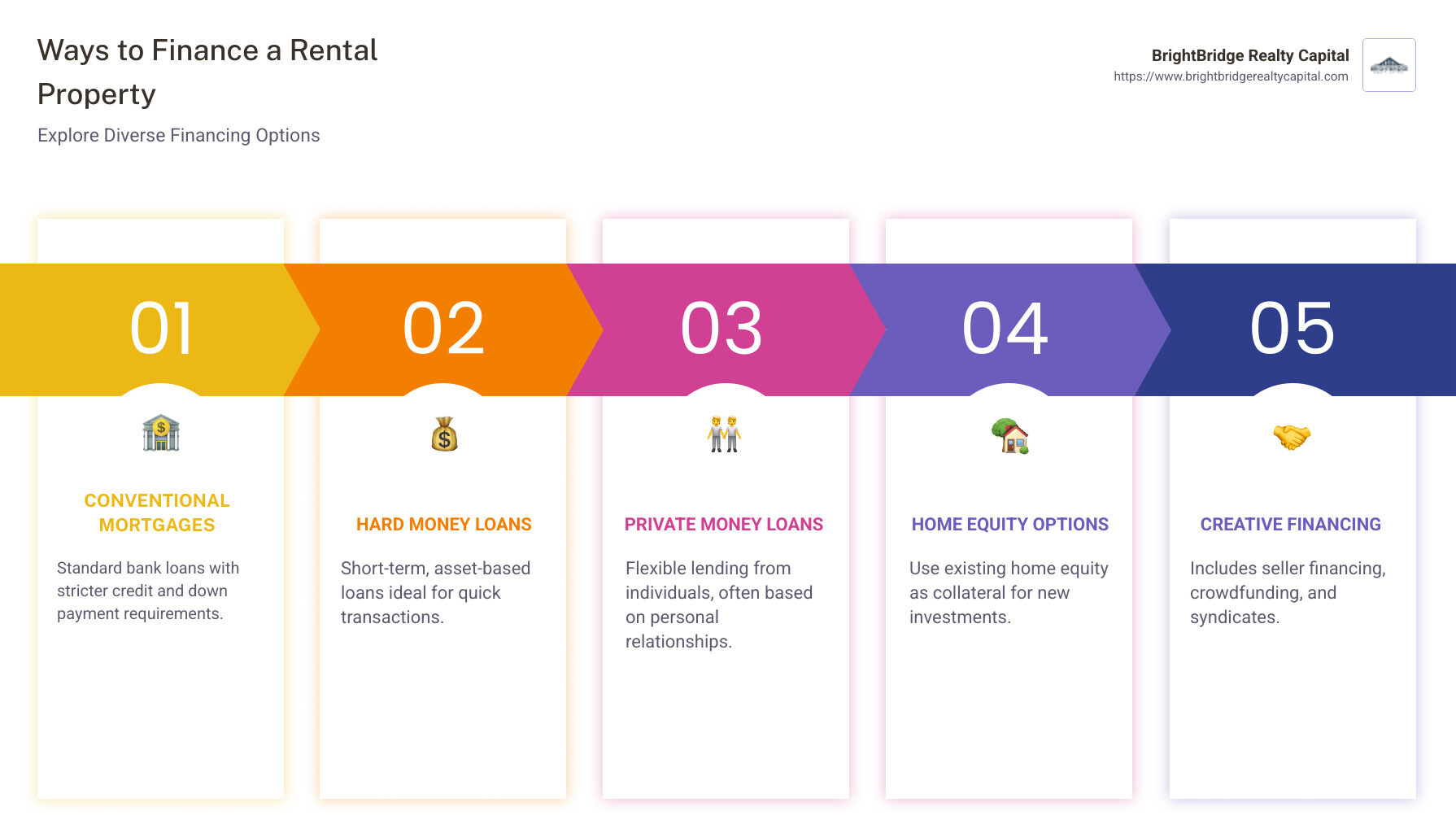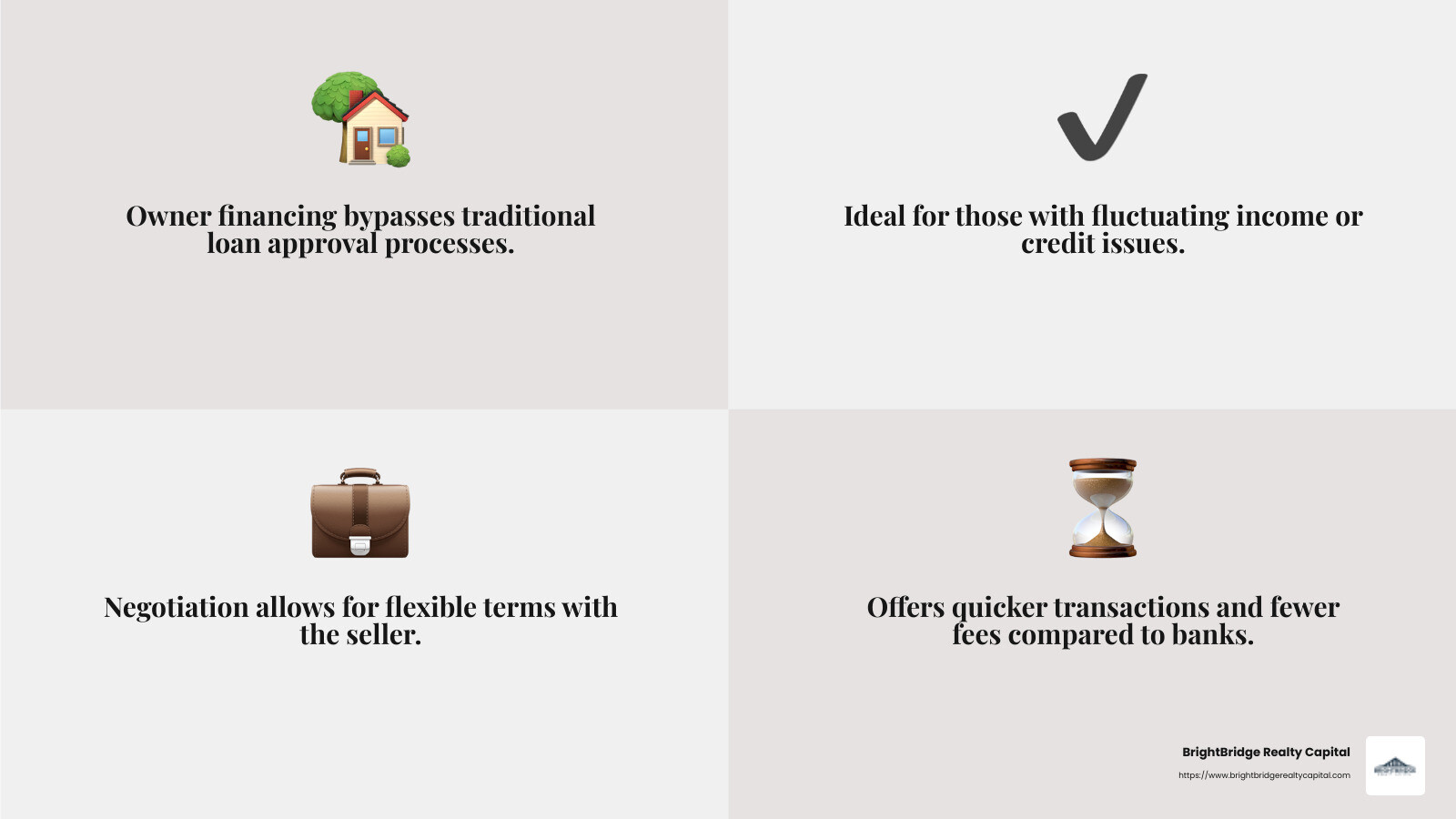Funding Your Future: Creative Ways to Finance a Rental Property

Investing in rental properties can be a rewarding way to build wealth, capitalize on appreciating real estate value, and gain passive income. Ways to finance a rental property range from traditional to creative, offering diverse options to suit different financial situations and investment goals.
To quickly explore these options, consider these strategies:
- Conventional Mortgages: Standard bank loans with stricter credit and down payment requirements.
- Hard Money Loans: Short-term, asset-based loans ideal for quick transactions.
- Private Money Loans: Flexible lending from individuals, often based on personal relationships.
- Home Equity Loans and HELOCs: Use existing home equity as collateral for new investments.
- Creative Financing Strategies: Include seller financing, crowdfunding, and syndicates.
Real estate investment offers multiple avenues to secure the necessary funding, each with its pros and cons, custom to diverse needs.

Ways to finance a rental property terminology:
- creative financing for rental property
- how to finance your first rental property
- low down payment rental property loans
Make a Sizable Down Payment
When it comes to financing a rental property, making a sizable down payment can be a game-changer. This is because mortgage insurance doesn’t cover investment properties, so lenders typically require at least a 20% down payment. If you can manage 25%, you might snag an even better interest rate.
Why a Bigger Down Payment Matters
A larger down payment means you have more "skin in the game," which can be a powerful motivator to ensure your investment succeeds. Plus, it provides the bank with more security. If things go south, you'll lose your investment before the bank loses any money.

Interest Rates and Risk
Mortgage broker Todd Huettner points out that a bigger down payment can lead to lower interest rates. With more money upfront, lenders see you as less risky. This reduces their need to offset risk with higher interest rates.
The 20% Rule
While the standard is 20%, putting down more can save you money in the long run. A smaller loan balance means less interest over time. Plus, with a larger down payment, you might avoid the extra fees that come with a higher loan-to-value ratio.
In short, a sizable down payment is a smart move. It can help you secure a better interest rate, reduce your overall loan cost, and make you a more attractive borrower to lenders.
Next, we'll dive into why being a "strong borrower" is crucial in securing financing for your rental property.
Be a Strong Borrower
Securing financing for a rental property isn't just about the down payment. Being a strong borrower can make all the difference in getting the best loan terms. Here's what you need to focus on:
Boost Your Credit Score
Your credit score is one of the first things lenders will check. A higher score can open up better interest rates and loan terms. Most lenders look for at least a 640 credit score. However, a score of 700 or more can give you a significant advantage.
Why does this matter? A higher credit score signals to lenders that you're a responsible borrower. It reduces their risk, making them more likely to offer you favorable terms. As the saying goes, "Good credit opens doors."
Understand Loan-to-Value Ratio
The loan-to-value (LTV) ratio is the amount of the loan compared to the property's value. Lenders prefer a lower LTV ratio because it means less risk for them. Aim for an LTV ratio of 75% or lower. This means you're putting down at least 25% of the property's value as a down payment.
Pro tip: A lower LTV ratio not only reduces your risk but can also lead to lower interest rates. It's a win-win!
Build Up Your Reserves
Lenders like to see that you have cash reserves. This means having extra funds set aside to cover mortgage payments if rental income falls short. Aim for at least three to six months' worth of mortgage payments in reserves.
Why is this important? Cash reserves demonstrate financial stability. It reassures lenders that you can handle unexpected expenses or vacancies, reducing their risk.
The Power of Being Prepared
In summary, being a strong borrower involves more than just meeting minimum requirements. Focus on improving your credit score, maintaining a healthy LTV ratio, and building up your cash reserves. These steps will not only make you more attractive to lenders but also help secure better loan terms.
Next, let's explore how working with local banks and brokers can offer you more flexibility and custom options for financing your rental property.
Explore Local Banks and Brokers
When it comes to ways to finance a rental property, consider the potential benefits of working with local banks and mortgage brokers. These options can provide unique advantages that larger, national institutions might not offer.
Flexibility with Local Banks
Local banks often offer more flexibility than their larger counterparts. They understand the community and can tailor loans to fit local market conditions. This flexibility can be a game-changer if you have a smaller down payment or unique financial circumstances.
Why choose a local bank? They might be more willing to work with you if you don't meet the typical criteria for larger banks. Plus, their interest in local development can translate into more favorable loan terms.
Understanding the Local Market
Local banks and brokers have a deep understanding of the real estate market in your area. They know the trends, property values, and growth areas. This knowledge allows them to provide insights that can help you make informed decisions.
Pro tip: Use their expertise to your advantage. Ask questions about the best neighborhoods for investment and any upcoming developments that could affect property values.
The Advantage of Mortgage Brokers
Mortgage brokers act as intermediaries between you and potential lenders. They have access to a wide range of loan products and can shop around to find the best rates and terms for your situation.
Why use a mortgage broker? They can save you time and effort by doing the legwork for you. A good broker will have relationships with various lenders, increasing your chances of finding a loan that fits your needs.
Building Relationships
Building relationships with local banks and brokers can pay off in the long run. They can offer personalized service and may even provide opportunities for future investments or refinances.
Remember: In real estate, relationships matter. A strong connection with your lender or broker can lead to better terms and quicker approvals.
In conclusion, exploring local banks and brokers can provide the flexibility and market-specific insights you need to secure financing for your rental property. Next, we'll dive into the possibilities of owner financing and how it can be a viable option in today's market.
Owner Financing
Owner financing, also known as seller financing, is a unique way to finance a rental property. Instead of borrowing from a bank, you make payments directly to the seller. This method can be a game-changer, especially if you face challenges meeting traditional credit standards.
Why Consider Owner Financing?
Owner financing can be a great option if you have difficulty securing a bank loan due to credit issues or if you're self-employed with fluctuating income. It allows you to bypass the stringent credit checks and loan approval processes of traditional lenders.
Credit Standards: With owner financing, the seller sets the credit standards. This flexibility can be beneficial if you have a less-than-perfect credit score but can demonstrate the ability to make regular payments.
Crafting a Strong Game Plan
To successfully negotiate owner financing, you need a solid game plan. Start by doing your homework on the property and its market value. Understand the seller's motivations—are they looking for a steady income stream, or do they want a quick sale?
Pro Tip: Present a well-thought-out proposal to the seller, highlighting your financial stability and commitment to maintaining the property. This can build trust and make them more likely to agree to financing terms.
Mastering Seller Negotiation
Negotiating with a seller requires tact and understanding. Be prepared to discuss terms like the interest rate, repayment schedule, and any down payment. The seller is taking on the risk of financing, so they may ask for a higher interest rate than a traditional lender.
Seller Negotiation: It's crucial to be clear about your expectations and limitations. Be open to compromise, as flexibility can lead to a mutually beneficial agreement.
Benefits and Considerations
Owner financing can offer several benefits, such as faster closings and fewer fees. However, consider potential drawbacks, like higher interest rates and the risk of balloon payments at the end of the loan term.

In summary, owner financing can be a viable option for those who have difficulty securing traditional loans or who want to negotiate terms directly with the seller. It's a powerful tool in your arsenal of ways to finance a rental property. Next, we'll explore how tapping into home equity can provide the funds you need for your investment.
Tap into Home Equity
Tapping into your home equity is a smart way to finance a rental property. If you've built up equity in your home, you can use it to fund your next investment. Let's explore three popular options: home equity loans, HELOCs, and cash-out refinancing.
Home Equity Loan
A home equity loan allows you to borrow a lump sum of money using your home as collateral. This loan comes with a fixed interest rate, making it predictable and easy to plan for.
Pros:
- Fixed interest rates mean consistent payments.
- Lower interest rates than most credit cards or personal loans.
- Long repayment terms can lower monthly payments.
Cons:
- Risk of losing your home if you can't make payments.
- May require at least 20% equity in your home.
- Closing costs and fees can add up.
HELOC (Home Equity Line of Credit)
A HELOC is like a credit card backed by your home equity. You can borrow as needed during the draw period, which gives you flexibility.
Pros:
- Interest-only payments during the draw period can be more manageable.
- Typically lower interest rates than unsecured loans.
- Access funds as needed, rather than a lump sum.
Cons:
- Variable interest rates can make payments unpredictable.
- Risk of foreclosure if you can't pay back the loan.
- Fees and closing costs may apply.
Cash-Out Refinance
Cash-out refinancing involves replacing your existing mortgage with a new, larger one. You receive the difference in cash, which you can use for your rental property investment.
Pros:
- May secure a lower interest rate than your current mortgage.
- No need for a second mortgage.
- Potential to borrow more than with unsecured loans.
Cons:
- Reduces the equity in your home.
- Fees and closing costs can be significant.
- Risk of foreclosure if payments aren't met.
Tapping into home equity can be a powerful tool in your arsenal of ways to finance a rental property. It's important to weigh the pros and cons of each option and choose the one that aligns best with your financial situation and investment goals.
Next, we'll dive into some creative financing options that might surprise you.
Creative Financing Options
When traditional methods don't fit the bill, creative ways to finance a rental property can offer unique opportunities. Let's break down some options that might just be the perfect fit for your investment strategy.
Peer-to-Peer Lending
Peer-to-peer (P2P) lending connects borrowers directly with investors through online platforms. This can be an alternative if banks aren't an option.
Pros:
- Potentially lower interest rates than traditional banks.
- Easier approval process for those with less-than-perfect credit.
- Quick access to funds.
Cons:
- Higher interest rates for those with poor credit.
- Limited borrowing amounts compared to traditional loans.
- Platform fees can add up.
Fix-and-Flip Loans
Fix-and-flip loans are short-term loans for investors looking to renovate and sell properties quickly. These are typically hard money loans with high interest rates.
Pros:
- Fast funding, often within a few days.
- Flexible terms compared to traditional financing.
- Easier qualification process.
Cons:
- High interest rates and fees.
- Short repayment periods.
- Risk of losing the property if unable to repay.
Life Insurance Policies
You can borrow against the cash value of a permanent life insurance policy. This can be a flexible and low-cost borrowing option.
Pros:
- No credit check required.
- Low interest rates.
- Flexible repayment terms.
Cons:
- Reduces the policy's cash value and death benefit.
- Newer policies may not have enough cash value.
- Interest on unpaid loans can accumulate.
Credit Cards and Personal Loans
These options can provide quick funds but often come with high interest rates. They're best for smaller expenses related to your rental property.
Pros:
- Immediate access to funds.
- No collateral required.
- Some credit cards offer 0% introductory APR.
Cons:
- High interest rates after introductory offers.
- Low borrowing limits.
- Can negatively impact your credit score.
Margin Loans
Margin loans let you borrow against your investment portfolio. This can be a quick way to fund a rental property.
Pros:
- Fast funding without selling investments.
- Lower interest rates than credit cards.
- No prepayment penalties.
Cons:
- Variable interest rates can rise over time.
- Risk of a margin call if your portfolio value drops.
- Limited to 50% of your portfolio's value.
Crowdfunding
Crowdfunding allows multiple investors to pool resources for real estate projects. This can reduce individual financial burden.
Pros:
- Share risk with other investors.
- Minimal credit requirements.
- Scalable across multiple properties.
Cons:
- Must share control and decision-making.
- Fees and costs involved.
- Fierce competition for funding.
Partnership
In a real estate partnership, multiple investors team up to buy properties. This reduces individual risk and capital needs.
Pros:
- Lower capital requirement per partner.
- Shared risk among partners.
- Access to larger investments.
Cons:
- Shared decision-making and control.
- Potential for unequal contributions and conflicts.
- Responsible for partners' debts or actions.
These creative financing options provide diverse paths to fund your rental property ventures. Whether you're seeking quick funding or reduced personal risk, there's likely a solution that aligns with your investment goals. Next, we'll tackle some common questions about financing rental properties.
Frequently Asked Questions about Ways to Finance a Rental Property
What is the minimum down payment for a rental property?
The minimum down payment for a rental property is generally 20% of the purchase price. This is higher than the down payment typically required for a primary residence. Lenders consider rental properties to be riskier investments, so they require more "skin in the game" from borrowers. However, if the property is owner-occupied, such as in a house hacking scenario, the down payment could be lower.
How does a debt-service coverage ratio affect financing?
The debt-service coverage ratio (DSCR) is crucial for financing rental properties. It measures the property's ability to generate enough rental income to cover its mortgage payments. A DSCR of 1.2 or higher is usually required by lenders, indicating the property is generating sufficient income to cover its debts. A higher DSCR makes you a more attractive borrower, potentially leading to better loan terms.
What are the risks of using a HELOC for investment?
Using a home equity line of credit (HELOC) to finance a rental property can be risky. Here are some potential risks:
- Variable Interest Rates: HELOCs often come with variable interest rates, which can increase over time, raising your repayment costs.
- Secured by Your Home: Since a HELOC is secured by your primary residence, failure to repay could put your home at risk.
- Market Fluctuations: If property values decrease, you might owe more than your home is worth, complicating future refinancing or sales.
Understanding these risks can help you decide if a HELOC is the right choice for your investment strategy.
Conclusion
BrightBridge Realty Capital is your partner in navigating the complex world of rental property financing. We offer customized solutions custom to meet your specific investment needs. Whether you're a seasoned investor or just starting, our team is dedicated to helping you find the right financing options that align with your goals.
One of our standout features is our ability to provide fast closings, often within a week. This speed can be a game-changer, allowing you to seize opportunities quickly and keep your projects on track. As a direct private lender, we eliminate intermediaries, offering competitive rates and a seamless process.
Investing in rental properties can be daunting, but with the right financial partner, it becomes a journey towards building wealth and securing your future. Let us help you explore the ways to finance a rental property that best suit your strategy.
For more information, visit our BrightBridge Realty Capital page and find how we can support your real estate investment journey.


